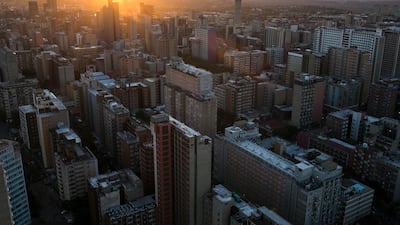Cape Town // One of South Africa's largest construction companies, Group Five, a company whose success was partly on UAE building contracts, filed for bankruptcy after creditors declined to extend it further loans.
Group Five has battled to make money for years since the 2008 financial downturn hit property sectors globally, including the Arabian Gulf, where the company was heavily exposed in the UAE. Group Five in 2005 was contracted to construct the mega-terminal at Dubai International Airport and worked on the Jebel Ali airport complex.
On Tuesday, the company said it could no longer pay its creditors. “It appears to be reasonably unlikely that the company will be able to pay all of its debts as they fall due and payable within the immediately ensuing six months,” Group Five said. “As a result, the board of directors of Group Five and G5 Construction have resolved to place each of these companies into business rescue.”
In 2007, the company had a peak market value of 8.2 billion rand (Dh2.09bn), but was worth less than 100 million rand when the shares stopped trading on the Johannesburg Stock Exchange on Tuesday. The share price over the same time frame dropped from a high of 74 rand to 89 cents per share by the time trading was suspended. Group Five joins two other large South African construction companies in filing for bankruptcy – Basil Read and Erbacon Construction.
“There’s a lot of red ink out there,” said Craig Parker, research director at Frost & Sullivan Africa. “The construction sector, along with cement producers, have had it tough year after year,” he said.
South Africa's mining industry, which provided a baseline of steady large-scale construction projects, has been moribund for years. New mining projects have grown scarce as investors stayed away amid fears the government was planning to increase black ownership quotas and even carry out wholesale nationalisation.
The South African economy is struggling with a gross domestic product growth rate of around 1.3 per cent for 2017, far short of the minimum of 5 per cent that economists say it needs. This means the bloodletting in the construction industry will not end with Group Five, said Mr Parker.
"I do unfortunately suspect we will see more casualties, especially among those dependent on large capital projects," he said, and does not foresee a turnaround before 2020 at least.
Even the other end of the construction scale – home building and improvements – is showing signs of stress.
Statistics South Africa, the state data agency, reported this week that retail sales from hardware stores were flat. Sales for hardware, paint and glass retailers shrank 1.5 per cent for the past three months of 2018.
Initially, the construction industry did appear to be landing on its feet after 2008, when South Africa secured the Fifa World Cup in 2010 that unleashed building contracts to the value of $3bn. New stadiums and a modern rail link between Johannesburg and its international airport kept companies busy.
Unfortunately, before the first ball was kicked in the tournament, local authorities began investigating World Cup-related contracts for collusion, which resulted in a multimillion-dollar settlement package from companies involved. The regulator, the Competition Commission, settled with 15 companies in 2013, while Group Five was granted immunity for co-operation.
Finding new markets outside South Africa also did not go as planned. Group Five secured a contract in the Kpone district of the Greater Accra Region in Ghana to construct a power station. The $410m project fell behind and the company was sued for at least $62m in damages last year.
While Group Five may not survive bankruptcy, the rest of the industry will be hanging on in hope that a promised 400bn rand infrastructure spend pledged by South Africa’s President Cyril Ramaphosa will come to their rescue.
In September last year, Mr Ramaphosa announced a 10-year plan to invest in roads, schools, hospitals and other crucial infrastructure. “We have decided to set up what we call a South Africa Infrastructure Fund, which will fundamentally transform our approach to the roll-out, building and implementation of infrastructure projects,” he told parliament.
By the time the first cheques are written though, many of the once proud companies whose billboards dotted construction sites in Abu Dhabi and Cape Town, may be reduced in size – or have vanished completely. The local industry may not be able to respond, said Wayne McCurrie, a portfolio manager at Ashburton Investments. Instead, contracts may have to go to foreign companies that have the capacity to fulfil them.
“When the South African economy does turn up again, it is going to have severe capacity constraints in building and construction,” Mr McCurrie said.

